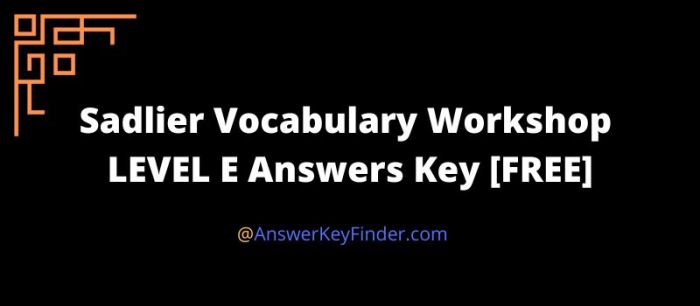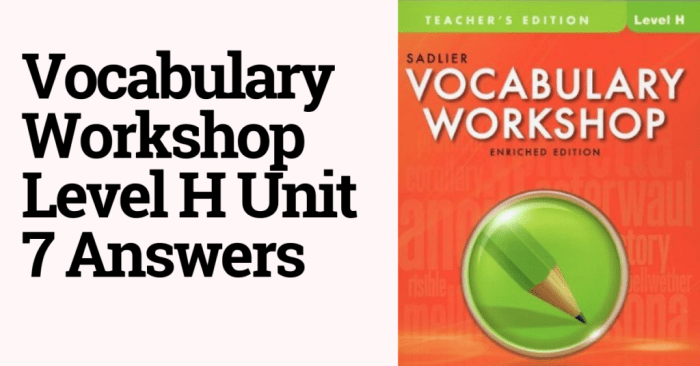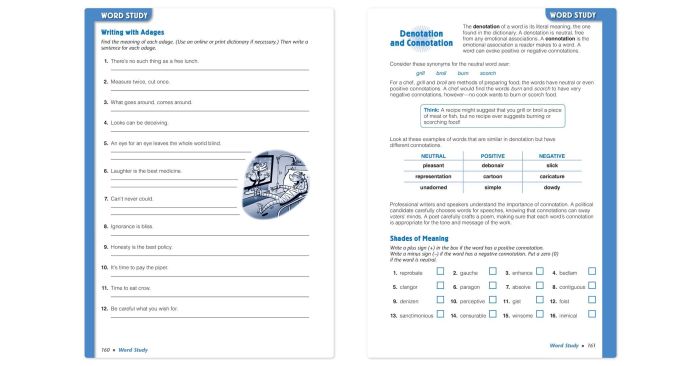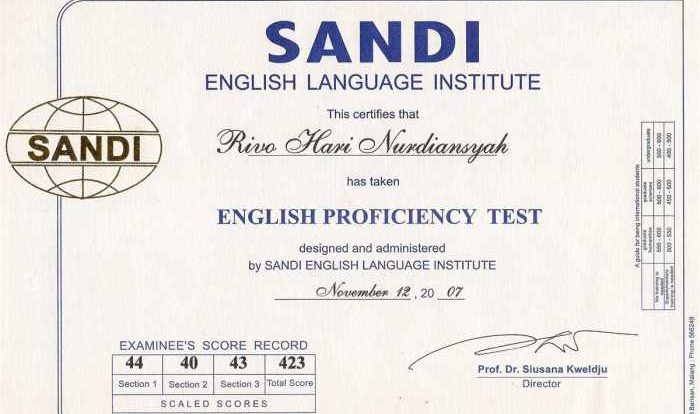Embark on an enlightening journey with Vocabulary Workshop Level F Unit 12 Answers, an invaluable resource meticulously crafted to enhance your vocabulary and unlock the intricacies of language. This comprehensive guide delves into the meanings, origins, and applications of essential vocabulary, empowering you to express yourself with precision and eloquence.
Our expert team has meticulously compiled a wealth of information, providing clear definitions, engaging examples, and practical tips to help you master the nuances of vocabulary. Whether you’re a student, a professional, or an avid reader, this guide will serve as your trusted companion, elevating your language skills to new heights.
Vocabulary Words and Meanings

Unit 12 introduces a set of vocabulary words that expand our understanding of various concepts and ideas. Let’s delve into their definitions, examples, and etymological origins.
- Aberration: A deviation from the norm or expected pattern. (Example: The athlete’s performance was an aberration from his usual excellence.)
- Ephemeral: Lasting for a very short time. (Example: The ephemeral beauty of a flower is fleeting and cherished.)
- Indolent: Characterized by laziness or inactivity. (Example: The indolent student procrastinated on his assignments.)
- Magnanimous: Showing generosity or forgiveness, even to those who have wronged us. (Example: The magnanimous king pardoned his enemies.)
- Moribund: In a state of decline or near death. (Example: The moribund industry struggled to survive in the changing market.)
- Peculiar: Strange or unusual. (Example: The peculiar behavior of the animal baffled the researchers.)
- Precarious: Unstable or dangerous. (Example: The precarious cliff face required careful navigation.)
- Quixotic: Idealistic or unrealistic, often involving a futile quest. (Example: The quixotic knight errantly pursued his unattainable dream.)
- Remiss: Neglectful or failing in one’s duty. (Example: The doctor was remiss in not following up with his patient.)
- Verbose: Using or containing excessive words. (Example: The verbose politician droned on for hours, filling the air with empty rhetoric.)
Word Usage and Application: Vocabulary Workshop Level F Unit 12 Answers

To effectively use these vocabulary words, it is essential to understand their correct application in sentences. Consider the following examples:
- The scientist observed an aberration in the data, indicating a possible error.
- The ephemeral nature of our existence reminds us to cherish each moment.
- Indolence is a vice that can lead to stagnation and failure.
- The magnanimous gesture of the victor toward the defeated opponent earned him universal respect.
- The moribund economy showed no signs of recovery, causing widespread concern.
To improve vocabulary and word usage, engage in regular reading, practice writing, and utilize online resources like dictionaries and thesauruses.
Reading Comprehension and Vocabulary

Expanding vocabulary significantly enhances reading comprehension. When readers encounter unfamiliar words, they can use context clues to infer meaning and improve their overall understanding of the text.
Strategies for improving vocabulary while reading include:
- Annotating unfamiliar words and looking up their definitions.
- Reading widely and exposing oneself to diverse vocabulary.
- Engaging in discussions or writing summaries to reinforce comprehension and vocabulary retention.
Vocabulary Building Activities

Interactive games and activities can make vocabulary building an enjoyable and engaging experience. Consider the following:
- Wordle: A popular online game that challenges players to guess a five-letter word within six attempts.
- Scrabble: A classic board game that rewards players for creating words using letter tiles.
- Crosswords: Puzzles that require players to fill in words based on clues and definitions.
- Vocabulary flashcards: Create flashcards with vocabulary words on one side and definitions or examples on the other.
Regular vocabulary practice is crucial for memorization and retention. Engage in daily reading, write short stories or poems using new words, and participate in vocabulary-building games to enhance your lexical repertoire.
Assessment and Evaluation
Assessing students’ understanding of vocabulary words is essential to track progress and identify areas for improvement.
Consider the following assessment methods:
- Vocabulary quizzes: Short quizzes that test students’ definitions and usage of vocabulary words.
- Essays: Require students to use vocabulary words in context to demonstrate comprehension and application.
- Technology-based assessment: Utilize online platforms or apps that provide interactive vocabulary exercises and track student progress.
Clarifying Questions
What is the purpose of Vocabulary Workshop Level F Unit 12 Answers?
Vocabulary Workshop Level F Unit 12 Answers is designed to provide comprehensive support for individuals seeking to enhance their vocabulary and language skills.
How can I use this guide to improve my vocabulary?
This guide offers a wide range of resources, including clear definitions, engaging examples, and practical tips, to help you effectively expand your vocabulary.
What types of activities are included in this guide?
The guide features interactive games, vocabulary-building exercises, and reading comprehension activities to enhance your learning experience.

